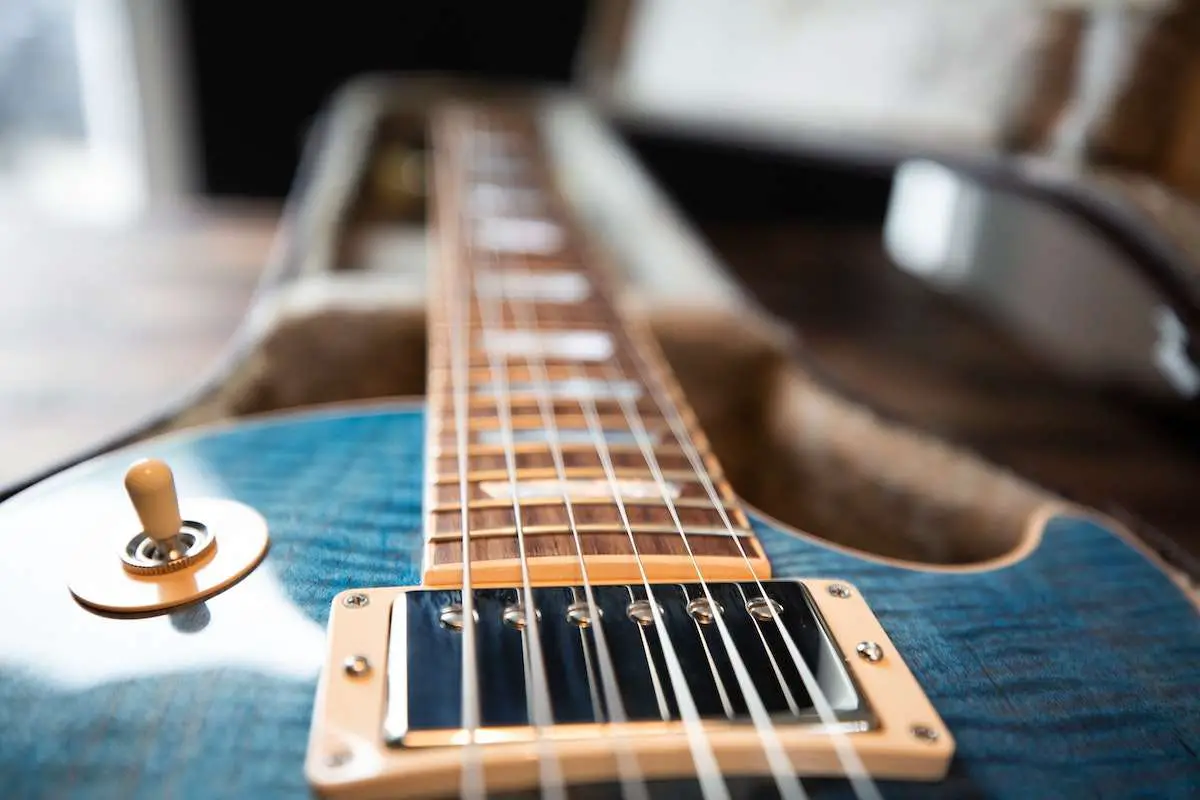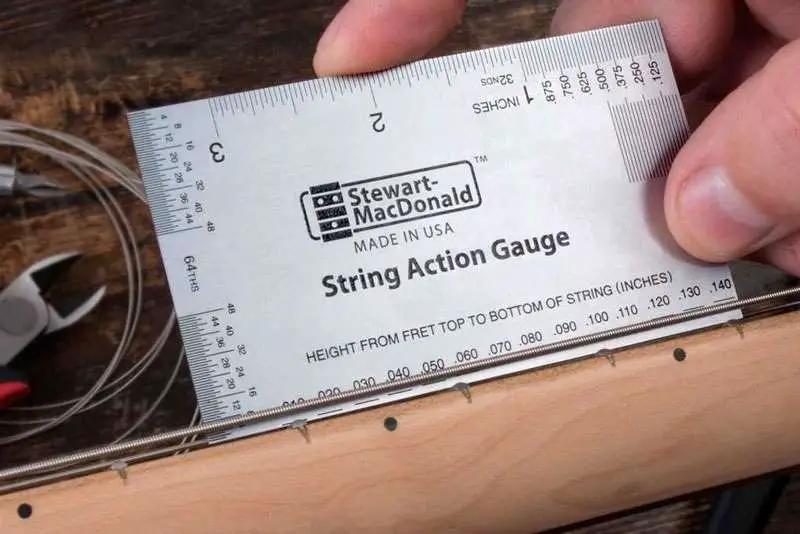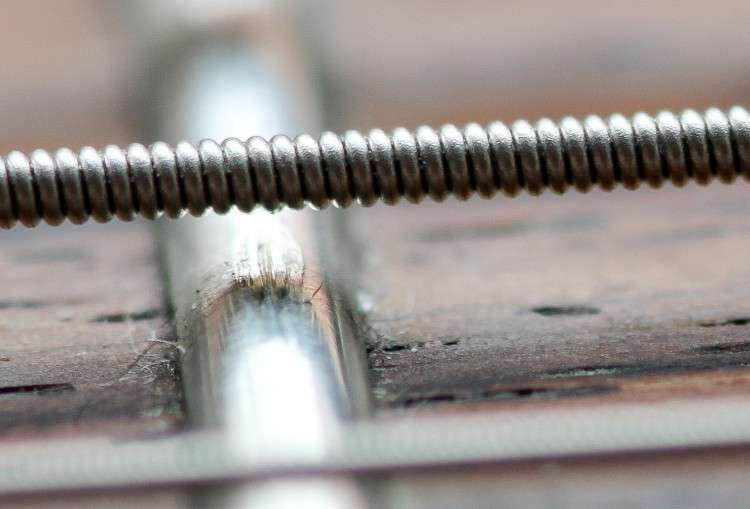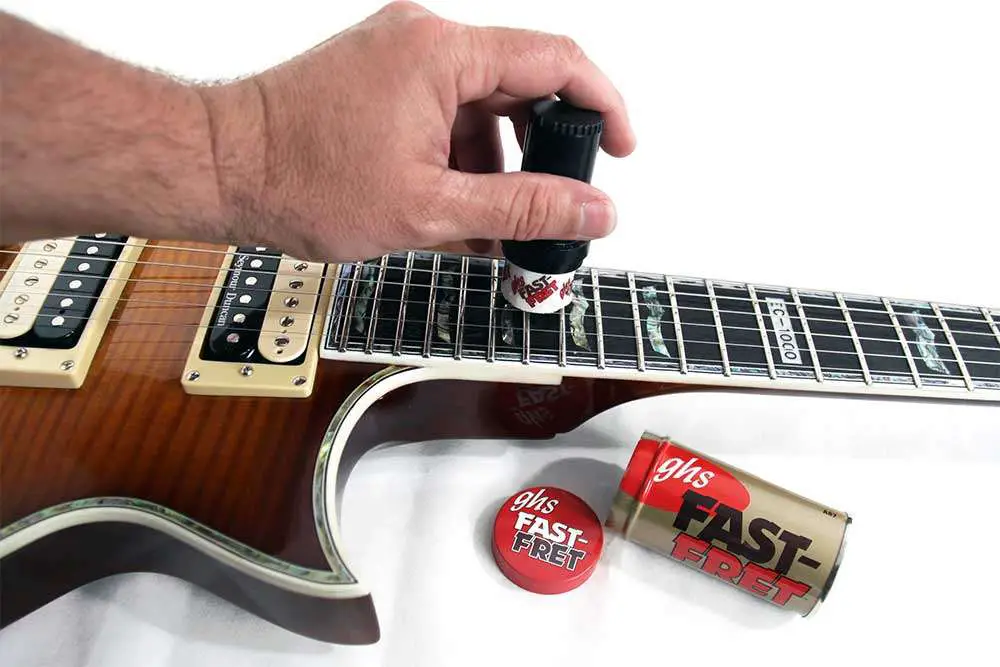You might be wondering why do my guitar strings rattle when I pluck a string or play a certain note?
Guitar strings can rattle or buzz for a variety of reasons, but the most common causes are related to the physical condition & setup of the guitar itself. This applies to both electric & acoustic guitar.
When a guitar string vibrates, it produces a sound wave that travels through the guitar’s body and out of its sound hole or pickups.
However, if the string comes into contact with any part of the guitar that it shouldn’t, such as a fret that is too low or a loose piece of hardware, it can create fret buzz or a rattling sound.
That’s not all though, other potential causes of rattling strings include old or worn-out strings, incorrect string height or tension, and improper setup or adjustment of the guitar’s components.
In order to prevent or address buzzing strings, it is important to keep your guitar well-maintained and properly set up, and to address any issues with frets, hardware, or all the strings as soon as they arise.
We’ll go over some of the fixes, how to diagnose the issue, and answer some frequently asked questions near the bottom.

Causes of Guitar String Rattle
Loose or worn-out frets
Loose or worn-out frets can cause guitar strings to rattle or buzz because they create an uneven surface for the strings to vibrate against.
Over time, the constant pressure and friction of the strings can cause the frets to wear down & create a groove or become loose due to manufacturing issues.
When this happens, the strings may no longer make full contact with the frets, and instead vibrate against the gaps or irregularities in the frets.
This can create a buzzing or rattling sound, especially when playing certain notes or chords that cause the strings to vibrate against the problematic frets.
Additionally, if the frets are not level or are not seated properly in the fretboard, this can also cause rattling or buzzing when the strings are played.
In order to fix this issue, the affected frets may need to be reseated or replaced by a professional guitar technician or luthier.
Related: How to clean your guitar fretboard
Improper string height
Improper string height, also known as action, can cause guitar strings to rattle or buzz because it affects how the strings vibrate against the frets.
If the strings are too low, they can vibrate against the frets more easily, creating a buzzing or rattling sound.
Conversely, if the strings are too high, they may require more force to press down & affect playability.
To address this issue, the string height can be adjusted by raising or lowering the strings at the bridge or the nut.
However, this adjustment requires careful consideration of the guitar’s overall setup and may be best done by a professional guitar technician or luthier.
Additionally, choosing the appropriate string gauge for your playing style and guitar setup can also help prevent or alleviate buzzing caused by improper string height.
If your guitar is set up for 9 gauge strings & you slap on some extra heavy 13’s, your guitar will likely need to be adjusted to handle the differences.
Loose hardware
Loose hardware such as the tuning pegs, the bridge, the nut, as well as any screws, bolts, or other fasteners can also cause rattling issues.
These components may come loose with time or if they weren’t properly tightened to begin with.
This is common & it’s worth inspecting all of your hardware during regular maintenance.
However, it is important to avoid over-tightening, as this can strip the threads or cause other damage.
Old or worn-out strings
Old or worn-out strings can cause string rattling in a guitar because they may not vibrate cleanly against the frets or other guitar components.
Over time, guitar strings can become corroded or worn down from use, which can cause them to develop grooves or flat spots.
As a result, when the strings are played, they may buzz or rattle against the frets or other components of the guitar.
To prevent string rattling caused by old or worn-out strings, it is important to change your strings regularly, depending on how often you play and how often you sweat or otherwise come into contact with the strings.
As a general rule of thumb, it is recommended to change your guitar strings every couple of months, more frequently if you play regularly, or if you notice any signs of wear or corrosion on the strings.
How to Diagnose Rattling Strings
Listening To Identify The Rattle Source
Here are some steps to follow to diagnose rattling strings by listening for and identifying the source of the rattling:
- Play each string individually and listen for any buzzing or rattling sounds.
- Try playing different notes up and down the neck to identify where the rattling is occurring.
- If the rattling is occurring on open strings, it may be caused by loose hardware, worn-out strings, or an issue with the nut.
- Consider that if the rattling is occurring on specific frets, it may be caused by worn-out or loose frets or improper string height.
- Also if you get a rattle across multiple frets, it may be caused by a bowed or warped neck, which can cause uneven string height and contact with the frets.
- Use your fingers to gently press down on different parts of the guitar to identify any loose or rattling hardware or components.
- If you are still unsure of the source of the rattling, try playing the guitar through an amplifier to hear the issue more clearly and pinpoint the source.
- Finally, it’s important to remember that some issues, such as loose or worn-out frets, may require the attention of a professional guitar technician or luthier to properly repair.
Related: How To Tune an 8 String Guitar
Visual inspection of guitar components
Here’s some steps to follow to diagnose rattling strings by visual inspection of guitar components:
- Inspect the guitar’s hardware, including the tuning pegs, bridge, and nut, for any signs of wear or looseness. Tighten any loose hardware with a screwdriver or wrench, but be careful not to over-tighten.
- Take a closer look the guitar’s neck and frets for any signs of wear or damage, such as grooves, cracks, or sharp edges. Worn or loose frets can cause string rattling and may need to be replaced or re-seated by a professional guitar tech or luthier.
- Take a look at the guitar’s strings for signs of wear or damage, such as corrosion or flat spots.
- Check the guitar’s truss rod for proper adjustment. If the neck is bowed or warped, it can cause uneven string height and contact with the frets. If unsure, seek professional help on this one.
- Do an inspection on the guitar’s saddle for any signs of wear or damage. A worn or improperly adjusted saddle can cause buzzing or rattling, particularly on the lower strings.
- Also check the guitar’s pickup height and pole pieces for any signs of wear or damage. Improper pickup height or damaged pole pieces can cause string rattling and may need to be adjusted or replaced.
- Final note, some issues such as fret wear or neck warping, may require the attention of a professional guitar technician or luthier to properly diagnose and repair. You may be able to identify the issues here but we recommend seeking a pro to get the fix.

Related: How to check & adjust your guitar’s action height
Checking string height and tension
Here are some steps to follow to diagnose rattling strings by checking string height & tension:
- Use a ruler or feeler gauge to measure the distance between the guitar strings and the frets. The distance should be consistent across all strings and should be adjusted according to the guitar’s specifications.
- Check the guitar’s string tension by pressing down on each string at the 12th fret and checking the distance between the string and the fret. The distance should be around 2mm (6/64) for most guitars. If the distance is too high or too low, the string height may need to be adjusted.
Prevention Tips for Rattling Strings
- Keep your guitar properly humidified to prevent changes in wood that can cause the neck to warp or bow. Store your guitar in a case with a humidifier or use a room humidifier to keep the humidity level around 45% to 55%.
- Replace your guitar strings regularly to prevent wear and tear that can cause string rattling. Consider using a string gauge that suits your playing style/tone & be sure to adjust your guitar if you make a big jump in string gauges.
- Inspect and adjust your guitar’s intonation and adjust the saddle position accordingly regularly to ensure proper pitch across the fretboard.
- Also Check and adjust your guitar’s string height to ensure even contact with the frets. Use a ruler or feeler gauge to measure string height, and adjust the bridge or saddle as needed.
- Take a look and adjust your guitar’s truss rod to ensure proper neck curvature. Use a specialized tool to make small adjustments to the truss rod, and check string height and pitch after each adjustment.
- Ensure that all hardware on your guitar is properly tightened and secured. Use a screwdriver or wrench to tighten tuning pegs, bridge, and saddle screws. Beware not to overtighten.
- Use proper guitar technique when playing to reduce excessive string pressure and prevent string buzzing. Play with a light touch and avoid pressing down on the strings too hard.
- Take your guitar to a professional guitar technician or luthier for repairs or adjustments if you’re unsure of how to fix rattling strings yourself.

Frequently Asked Questions
Why is my guitar string shaking so much?
If your guitar strings are shaking, you might have a loose component such as the screws on your saddles or the tuning pegs.
Be sure to follow the tips listed above to diagnose where the issue is coming from.
Do heavier strings cause more buzzing?
Yes, using heavier strings can cause more buzzing if your guitar is set up to use light strings.
That’s not to say heavier strings are bad but you will likely need to adjust your string height to accommodate them.
Is rubbing alcohol good for guitar strings?
Isopropyl alcohol is great at stripping away oils & it won’t hurt your guitar strings. However you need to be aware that it can dry out the fretboard & damage certain plastics such as acrylic.
We don’t recommend dousing your fretboard in alcohol but if you want to use it, be sure to use it very sparingly & apply it to a microfiber cloth.
Is WD-40 good for guitar strings?
Although the WD-40 website states that it’s okay to use WD-40 on guitar strings, although I can’t say I’d recommend it.
I personally use this often for vehicle maintenance & it’s great for that, however because it leaves behind an oily film, you would need to be very careful to not get it everywhere as it can cause discoloration. There’s also some petroleum derivatives in there that are probably not the healthiest to handle.
Can you use it to clean your strings? Yeah you could probably spray some on a microfiber & carefully clean your strings that way. But if your strings are that heavily corroded, it’s probably best to just replace them altogether.
Should I lubricate guitar strings?
You don’t have to but it does provide a different playing experience. We recommend trying out some GHS Fast Fret, which appears to just be mineral oil. Good for cleaning the fretboard too. There’s also D’Addario XLR8 String Lubricant/Cleaner which might be worth a shot.
How do you get rid of string noise?
If you mean squeaking from shifting up & down strings? You use something like Fast Fret to help lessen the friction which is what causes it. To get rid of most of it though, you can try lifting your fretting hand off the strings between big jumps down the fretboard. This is easier said than done & could require some practice.
Does Fast Fret reduce string noise?
Yes because it reduces the friction of shifting your fingers across the strings. This is also stated on their product pages as one of the benefits.
Conclusion
Rattling strings on a guitar can be caused by worn-out frets, loose hardware, improper string height or tension, or old and worn-out strings.
To diagnose the cause of rattling strings, you can perform a visual & auditory inspection of the guitar’s components, as well as check the string height and tension.
Prevention and fixes can range from simple adjustments such as tightening loose hardware, changing strings,& adjusting string height.
For more complex adjustments, you might have to replace worn-out frets, deal with warped necks or truss rod adjustments, & nut adjustments.
If you’re unsure of how to fix rattling strings, taking your guitar to a professional is recommended.
We hope you found this article useful! Just don’t let a small issue like rattling strings discourage you from playing and enjoying your guitar.
If you have any other questions, feel free to leave them down below in the comments.

